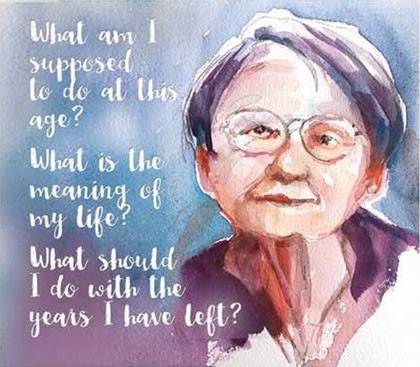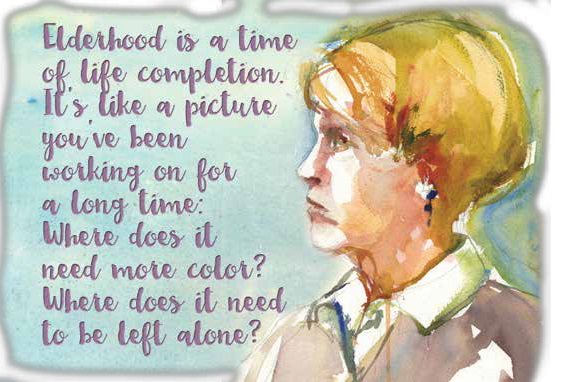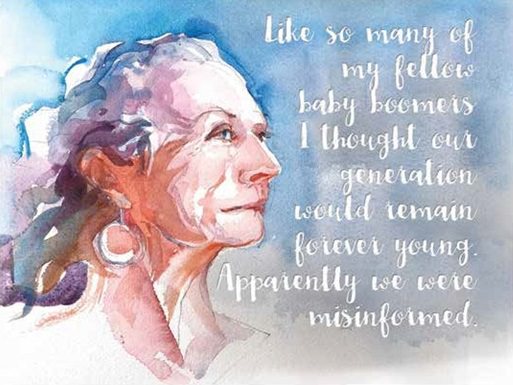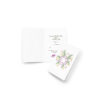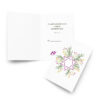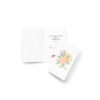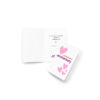Learning to accept your life as it is, discovering how to make the best choices and becoming more resilient in difficult times.
by RAHEL MUSLEAH
When Margaret Shapiro stopped coloring her hair at age 70 and reduced her work hours to one day a week, she suddenly realized that she no longer looked so young nor was she. “With less of a future ahead of me I found myself reflecting on my priorities,” says Shapiro, a psychotherapist in Philadelphia. Raising her children and achieving her own career goals were behind her, and though her life was a lot more relaxing, she faced the question, “What will I do now?”
To guide her in accepting her new stage in life, Shapiro, now 74, joined a “wisdom circle” that drew a dozen women from five area synagogues. It is run by Dayle Friedman, a rabbi who has devoted her career to the spirituality of aging. Friedman calls her practice “growing older,” offering learning opportunities, spiritual care and spiritual guidance to foster meaning and wholeness (growingolder.net). “It helped me to home in on my own wisdom,” says Shapiro, quantifying part of that wisdom as being “more accepting and positive with myself and my relationships. Wisdom is very different from being smart.”
Like Shapiro, Rabbi Rachel Cowan didn’t spend much time thinking about getting older. At 69, she was still working as executive director of the Institute for Jewish Spirituality (IJS) in Manhattan (www.jewishspirituality.org). “I thought maybe it would be good for me to do something different until I realized I didn’t know what you’re supposed to do when you’re this age.” All the words that labeled the stage of life she was entering had negative connotations. “Getting old is depicted as something you don’t want to do,” she says. “There’s no word with dignity.”
Cowan partnered with Linda Thal, founding co-director of the Yedidya Center for Jewish Spiritual Direction, which trains rabbis, cantors, therapists and others to provide spiritual guidance. After researching the subject comprehensively, the two focused on the phrase “wise aging”: learning to accept our life as it is, discovering how to make the best choices and becoming more resilient in difficult times. Unwise aging, says Cowan, “would be pretending you are not getting older, not living as fully as you would and not making reparations for illness or death.”
Their book, Wise Aging with Joy, Resilience and Spirit, published in 2015 by Berman House, has spawned peer groups all over the country interested in facing the next phase of their lives with self-awareness, equanimity and intentionality. Some groups are limited to a few weeks; some extend to months and even years. With funding from a variety of grants, IJS has now developed a group curriculum and has trained 250 facilitators to guide participants in text study, active listening, body awareness exercises, reflection, guided meditation and journaling. Topics range from body image and practicing forgiveness to living with loss and leaving a legacy.
The wise aging curriculum Cowan and Thal have constructed, based on Harvard psychiatrist George Vaillant’s research on “successful aging,” focuses on developing a spiritual reserve that boosts a feeling of connectedness to self, others and God. “Joy doesn’t mean bubbly and happy but a stance that can hold sadness and still allow you to see goodness in life,” says Cowan, now 75. “Resilience guides you through difficult times and unwanted transitions so you don’t sink into self-pity, and spirit is a deep understanding that you are not alone in this world, that God cares for you and that you are part of something much bigger. I see it as an electric current that lifts up what is ordinary.”
Friedman, whose book, Jewish Wisdom for Growing Older, newly published by Turner Publishing, has chosen to emphasize “grit and grace,” the elements of resilience that include acceptance and gratitude without being “Pollyannaish.” “I’m interested in trying to tell the truth about growing older. There are many incredible opportunities, but if you live long enough you will not escape sorrow, limitations and frailty,” says Friedman, 60. “The great idolatry of aging is the belief that things should just stay the same. We need a new spiritual plasticity that allows a person to say, ‘It’s time for me to retire,’ or ‘Now I have a walker. That doesn’t mean I’m not me.’ ”
“This is a conversation that needs to be had by people who didn’t know they needed it,” says Cowan. “The groups are not about people trying to fix each other but about sharing stories and listening. It’s a relief to articulate questions about things you think about, like forgetting words or names, as well as the ultimate questions: What is the meaning of my life? What should I do with the years I have left?”
Rabbi Richard Address points out that both American society and the Jewish community are starting to wake up to the fact that we have a huge bubble of baby boomers comprising 76 million people. Address, 71, is the founder and director of Jewish Sacred Aging (jewishsacredaging.com), a forum for the Jewish community to discuss the implications of longevity for the aging baby boomer generation. Reports from the Social Security Administration and the Pew Research Center estimate that 10,000 people a day turn 65. According to Pew, most of the Jewish community is over 50. Because this generation is living longer in better health, the opportunities and challenges are new.
Economic fears are driving the issue in the general community: There’s not enough Social Security to go around. Medical costs can cause financial crises. Spiritual concerns are essential, say the handful of leaders in the Jewish community who are addressing the topic one they want to frame in the positive light of growth. “The third age, or elderhood, is a time of life completion,” says Lynne Iser, founder of Elder-Activists.org, whose mission is to provide education, support and inspiration to bring about a just society and sustainable world. “It’s such an opportunity to be able to look at our lives and where we need to be. It’s like a picture you’ve been working on for a long time: Where does it need more color? Where does it need to be left alone? It’s a time to review your life, to notice what you’ve done well and what needs to be resolved.”
Iser was one of the first in the Jewish community to focus on issues of aging. A quarter-century ago she and Jewish Renewal founder Reb Zalman Schachter-Shalomi created the Spiritual Eldering Institute. They used a “psycho-spiritual paradigm” to help practitioners and facilitators look at who they are, how they relate to people and how to face their own mortality. (Reb Zalman, who died in 2014, wrote From Age-ing to Sage-ing with Ronald Miller in 1995.) Iser notes that at the time, the only word for an older person was “senior,” and many birthday cards joked and still joke “You’re over the hill” or “Don’t worry, you’re still 39.” Reb Zalman’s perspective was that anyone can grow old but that it takes work to become an elder, a process using life experience. “We’ve learned that it’s good for people to prepare and complete their lives, to do their philosophical homework, to pass on bits of knowledge and wisdom,” says Iser. “The process of eldering is bigger than we are it’s spiritual because it’s beyond what we can touch and feel in our lives.”
Iser was 40 when she began working with Reb Zalman, so the subject was not personally relevant to her. Still, she found herself “in awe” of people in their late 60s who were excited about growing older. Now, at 66, she understands. The Spiritual Eldering Institute, which did not have a Jewish orientation, has evolved into Sage-ing International (www.sage-ing.org), and the ALEPH Sage-ing Program (www.aleph.org), cosponsored by Ruach Ha’aretz, carries on the work with a Jewish outlook anchored in prayer, liturgy, songs and teachings.
Perspectives on aging also include humor. “Growing older was something that happened to my grandparents,” writes William Novak in the introduction to his new book, Die Laughing: Killer Jokes for Newly Old Folks (Touchstone). “Like so many of my fellow baby boomers I thought our generation would remain forever young. Apparently we were misinformed.” For Novak, 68, who has co-written or ghostwritten numerous celebrity memoirs, jokes about memory loss and body changes don’t tell the whole reality of getting older, but they do provide a lighthearted and cathartic outlet. One example: “A man walks into a pharmacy. “I’m looking for some acetylsalicylic acid,” he tells the druggist. “You mean aspirin?” the druggist asks. “Thank you!” the man replies. “I can never remember that word.”
Despite the comic infusion, the stigma around growing older remains undeniable. Even finding a descriptive term that people embrace is difficult. “It’s such a large swath of life,” says Friedman. “People ask, ‘How can I at 60 be at the same stage as someone at 90?'” She, herself, doesn’t mind the term “aging.” “We are all aging from birth. It’s a process that connotes ‘becoming,’ whereas ‘old’ sounds like a permanent static thing.” She also likes “elder,” because of its sense of relationship to others. In Jewish tradition, it is used as an honorific for those connected with role, responsibility and wisdom.
But, she notes, many people are uncomfortable saying they, themselves, are old and wise, so Friedman often settles on the phrase “beyond midlife.”
Jewish texts and blessings can comfort people by connecting personal issues with the wisdom inherent in the tradition, says Cowan. “The groups offer space to think and spaciousness to listen,” she explains. “It’s an important skill for aging to learn how to accept rather than fight or deny where you are,” says Cowan, who herself dealt with loss at a relatively young age: When she was 47, her husband, Paul Cowan, was diagnosed with leukemia, dying at 48. “We learned to say, ‘We have this day.’ You can have great pain and loss in life and still be happy.”
Much of the wise aging perspective could be called wise living but that would defeat its purpose, says Cowan. “Aging is a stage of life that exists in a continuum. When you’re younger, job and family occupy you. As you get older, the questions become much more urgent.”
Ten years ago, Cowan initiated her first spirituality group, Vetaher Libenu (Purify our Hearts), which still meets monthly in her home. As the participants grew older they began focusing on the connection between spirituality and aging. Wise aging groups began at Manhattan’s Central Synagogue five years ago and are now spreading beyond the synagogue and JCC world to libraries and other institutions.
Elaine Cohen, 69, a retired educator, and Rochel David, 67, a retired psychologist and yoga instructor, facilitate three groups in Teaneck, New Jersey. One is a merger of two groups that have been meeting for almost two years at Conservative synagogue Beth Shalom, and two are new six-week sessions at the Jewish Family Service of Bergen and North Hudson. The meetings include mindfulness meditation, discussion of a Jewish text on a particular theme, and conversations that encourage reflection and contemplative listening. “We look for texts that reach an emotion or have insight,” David says.
The two group leaders emphasize that there is no pat formula or prescriptive wisdom, but having an accepting supportive group can open people’s eyes, develop trusting relationships and lead to moving and transformative experiences. For instance, after an exploration of forgiveness and self-forgiveness, one participant left feeling unsettled and later reached out to a friend with whom she had unfinished business. “No one told her to do that, but because of the discussion she was able to,” Cohen recalls.
“It’s our age cohort so the issues resonate with us as well,” Cohen adds. Conscious dying, one of the issues addressed at an IJS retreat for facilitators this past summer, was particularly challenging, she says. “It’s being intentional about the legacy we want to leave, being explicit about your values with your children, grandchildren and friends and trying to look at the long-term issues that extend beyond our own lives.” Friedman, who has run monthly wisdom circles in individual homes for the past five years, finds the experiences to be “intimate and deep.” Modeled on the women’s rosh hodesh (new moon) group she co-founded 17 years ago, the groups provide what she calls “provisions for the journey.” They are currently women-only gatherings, though that was not her intention. “Women are more immediately drawn to intimacy, sharing and reflection,” she posits, adding that men also want to make sense of their experience and that she hopes to create mixed-gender groups focused on study. Themes have included embracing interdependence, medical treatment at the end of life, what to do with “stuff” and time, prayer and God.
Of the biblical characters she explores in her book as paradigms, she admires Naomi most. Naomi starts at rock bottom she has lost her husband and sons but by the end of the story “somehow she’s dangling or nursing a grandchild and her daughter-in-law Ruth is creating the line of King David,” says Friedman. “Naomi is a character who embodies loss in later life but who begins again and is resilient. What helps her to do that is being in a relationship with Ruth and having someone to be responsible for.”
The synagogue, Jewish aging activists agree, can become a central force in changing attitudes toward growing older. Currently, the Jewish community has few formal programming resources learning and spirituality programming are largely focused on younger families, with identity-building targeting children and teens. Those who do care about the older population fund concrete needs like housing, health care and social services.
“Synagogues are inherently multigenerational,” Friedman says. “We need to create modalities to interact with and hear the wisdom of elders. When you know someone 85-plus who works at a homeless shelter and you’re 35, your view of aging changes.” She recalls that when she was a chaplain at the Philadelphia Geriatric Center, she developed many programs with synagogues, youth groups and Hillels. For instance, the youth group of Congregation Beth Sholom in suburban Elkins Park came to the nursing home once a month for Shabbat dinner and services. Each student was paired with an elder and was trained before and debriefed after each session. “My vision and agenda was to empower the young people to make contributions and the older people to share their wisdom. Each person has a soul and a story even if they look physically frail. When those kids are older they will be less afraid. They will never look at elders as just ‘the other.’ ”
Address of Jewish Sacred Aging works with synagogues to reestablish their connections to older members, many of whom leave, he says, because they don’t find much programming of interest to them. His programs examine issues of caregiving, wellness and mental health; consider the economics of aging and explore new rituals. When Address directed the Department of Jewish Family Concerns for the Union of Reform Judaism, he developed a project on sacred aging that has created awareness and resources for congregations. When URJ closed its program departments, he made the project his own. He highlights the need for it by pointing out that the Jewish Sacred Aging Facebook page has more than 24,000 followers.
His approach is grounded in six major Torah texts that he views as a guide to healthy aging. “It’s not good for man to be alone” (Genesis 2) stresses the need for relationships. God’s command to Abraham to “Go forth” (Lech Lecha, Genesis 12) empowers us to constantly evolve, change and take risks. Jacob’s struggle with the angel (Genesis 32) and the changing of his name to Israel mirrors the possibility of recreating our identities. The Burning Bush (Exodus 3) reflects the opportunity to reinterpret and create a relationship with God. The Holiness Code (Leviticus 19) emphasizes an integrated, holistic and sacred lifestyle. And Deuteronomy’s exhortation to “choose life” emphasizes the outlook of positive aging.
As an outgrowth of Address’ work, congregations have begun instituting “legacy programs” where people build their spiritual autobiographies and write ethical wills that set down what they want to leave behind in terms of moral, spiritual and ethical values. The sacred aging website also features an explosion of new rituals that tackle radically private issues: the removal of a wedding after a year of mourning, adult cohabitation, leaving a family home, being welcomed into a nursing home or signing an advanced directive or living will. “These are sheheheyanu (a blessing that gives thanks to God for enabling us to experience a special occasion) moments, that you are able to make these choices,” says Address. The most controversial, he says, is giving permission for a non-marital relationship to take place when a spouse has Alzheimers’ or dementia. “People are living these situations and want to know what their tradition says about it,” he adds.
Even for elder activists like Iser, delineating personal wisdom can be daunting. “I’ve been thinking about this a lot,” she says. “Am I a wise person? And if I don’t think so, how can I talk about it?” She says she has learned to try to live a life in balance, nurturing the intensity and strength of the unique spark that ignites her passion, joining it with the spark in others. “I’m still not a complete picture at all,” she observes. “I hope that when I die, I will be.”
Award-winning journalist and author Rahel Musleah leads tours of Jewish India and speaks about its communities. Her website is www.explorejewishindia.com. She wrote about the artist Lynne Avadenka in our fall 2016 issue.

